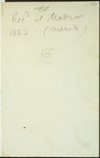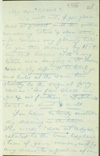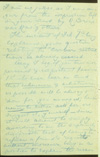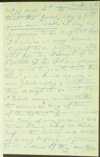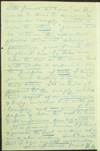Mahatma Letter No. 108
| Quick Facts | |
|---|---|
| People involved | |
| Written by: | Koot Hoomi |
| Received by: | A. P. Sinnett |
| Sent via: | unknown |
| Dates | |
| Written on: | unknown |
| Received on: | March 1883 |
| Other dates: | unknown |
| Places | |
| Sent from: | unknown |
| Received at: | Madras, India |
| Via: | unknown |
This is Letter No. 108 in The Mahatma Letters to A. P. Sinnett, 4th chronological edition. It corresponds to Letter No. 58 in Barker numbering. See below for Context and background.
< Prev letter chrono
Next letter chrono >
< Prev letter Barker
Next letter Barker >
Cover sheet
|
Received at Madras, March, 1883. |
NOTES: |
Page 1 transcription, image, and notes
|
My Dear "Ward," We will not, if you please, deal at present with the situation concerning "stars" & obscuration — for reasons very plainly told to you this morning by H.P.B. My task becomes with every letter more dangerous. It becomes exceedingly difficult to teach you and hold at the same time strictly to the original programme: "so far shall we go & no further." Yet — hold to it we must & will. You have entirely mistaken my meaning in the telegram. The words: "more at Adyar" related to the true explanation of your vision, not by any means, to a promise of some |
NOTES:
|
Page 2
|
further psychological experiments made in that direction by myself. The vision was due to an attempt by D.K. who is extremely interested in your progress. While he succeeded in getting you out of your body, he failed entirely in his effort to open your inner vision, for reasons correctly surmised at the time by yourself. I took no personal active part in the attempt. Hence my answer "surmises correct — more at Adyar." I am in a very false position just now, and have — in order not |
NOTES: |
Page 3
|
to jeopardise the possibilities of the future — to be doubly cautious. The probable date of your departure? Well — on or about April 7th. If your impatience disagrees with this desire of mine you are free to do as you like. Yet, I would look upon it as a personal favour. I am profoundly disgusted with the apathy of my countrymen in general. More than ever I trust but in the few staunch workers of the luckless and hapless T.S. The Viceroy's letter would be of the greatest help if it could be but judiciously used. But in such matters, I see |
NOTES:
|
Page 4
|
I am no judge, as I now augur from the impression left on your mind by R. Srinavasa Rao and others. The incident of February the 7th being explained, your question relating to "earlier restrictions" is already covered. May I beg of you two more personal and important favours? 1st — to ever bear in mind that whenever & whatever is possible will be always done for you unurged; hence never to either ask for, or suggest it, yourself — since it will amount to simply avoiding to me the supremely disagreeable task of having to refuse a friend's request without, moreover, being in a position to explain the reason why; |
NOTES: |
Page 5
|
and 2nd — to remember that though personally and for your own sake I may be prepared to do a great deal I have in no way bound myself to do anything of the sort for the Fellows of the British T.S. I have pledged my word to you to teach them through your kind agency — our philosophy and whether they accept it or not. But I have never undertaken to convince any of them of the extent of our powers nor even of our personal existence. Their belief or disbelief in the latter is a matter of very trifling importance to us indeed. If they are ever |
|
NOTES: |
Page 6
|
to be beneffited by our promise, it must be through you, alone and your own personal efforts. Nor can you ever see me (in flesh), — not even in a clearly defined vision — unless you are prepared to pledge your honour never to reveal the fact to anyone, so long as you live, (save you receive permission to that effect). That the consequence of such a pledge will be a never satisfied as an ever recurring doubt in the minds of your British Fellows — is just what we want for the present. Too much, or too little was said and proved of us as M.A. (Oxon) |
|
NOTES:
|
Page 7
|
justly remarked. We are ordered to set ourselves to work to sweep away the few vestiges — for which fresh policy you are indebted to the incessant underground intrigues of our ex-friend Mr. Hume — (now entirely in the hands of the Brothers of the Shadow) — and the more our actual existence be doubted — the better. As to tests and convincing proofs to the Sadducees of Europe generally and those of England especially — this is something to be left entirely out of our future programme. Unless allowed to use our own judgment and means — the course of future events will by no means run smooth. Thus you should never use such phrases as "for the sake of strength |
NOTES:
|
Page 8
|
with friends at home" as they would be sure to do no good and would simply irritate the more the other "powers that be" — to use the ridiculous phrase. It is not always flattering, good friend, to be placed even by those one likes the best — on the same level with shells and mediums — for the purpose of tests. I thought you had luckily outgrown that stage. Let us hold at present to the simply intellectual aspect of our intercourse and busy ourselves but with philosophy and — your future paper and leave the rest to time & its unforeseen developments. It is precisely because I follow and perceive the dual working of your mind in making such requests that I sign myself invariably Your affectionate friend, |
NOTES: |
Context and background
Physical description of letter
The original is in the British Library, Folio 2. George Linton and Virginia Hanson described the letter this way:
KH script in light blue pencil on two sheets of smooth folded note paper, 5" X 8" [12.7 X 20.3 cm], heavy lettering on all four sides.[1]
Publication history
Commentary about this letter
Notes
- ↑ George E. Linton and Virginia Hanson, eds., Readers Guide to The Mahatma Letters to A. P. Sinnett (Adyar, Chennai, India: Theosophical Publishing House, 1972), 175.
